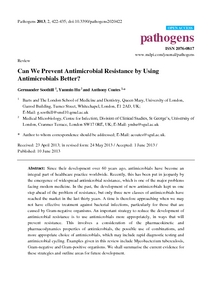Soothill, G; Hu, Y; Coates, A
(2013)
Can we prevent antimicrobial resistance by using antimicrobials better?
Pathogens, 2 (2).
pp. 422-435.
ISSN 2076-0817
https://doi.org/10.3390/pathogens2020422
SGUL Authors: Coates, Anthony Robert Milnes Hu, Yanmin
![[img]](https://openaccess.sgul.ac.uk/107276/1.hassmallThumbnailVersion/Can_we_prevent_antimicrobial_resistance.pdf)  Preview |
|
["document_typename_application/pdf; charset=binary" not defined]
Published Version
Download (331kB)
| Preview
|
Abstract
Since their development over 60 years ago, antimicrobials have become an integral part of healthcare practice worldwide. Recently, this has been put in jeopardy by the emergence of widespread antimicrobial resistance, which is one of the major problems facing modern medicine. In the past, the development of new antimicrobials kept us one step ahead of the problem of resistance, but only three new classes of antimicrobials have reached the market in the last thirty years. A time is therefore approaching when we may not have effective treatment against bacterial infections, particularly for those that are caused by Gram-negative organisms. An important strategy to reduce the development of antimicrobial resistance is to use antimicrobials more appropriately, in ways that will prevent resistance. This involves a consideration of the pharmacokinetic and pharmacodynamics properties of antimicrobials, the possible use of combinations, and more appropriate choice of antimicrobials, which may include rapid diagnostic testing and antimicrobial cycling. Examples given in this review include Mycobacterium tuberculosis, Gram-negative and Gram-positive organisms. We shall summarise the current evidence for these strategies and outline areas for future development.
| Item Type: |
Article
|
| Additional Information: |
© 2013 by the authors; licensee MDPI, Basel, Switzerland. This article is an open access article distributed under the terms and conditions of the Creative Commons Attribution license http://creativecommons.org/licenses/by/3.0/). |
| Keywords: |
antimicrobial resistance, pharmacokinetics, pharmacodynamics, minimum inhibitory concentration (MIC), mutant prevention concentration (MPC), micro biota, colonisation resist ance, antibiotic combination, bacteria - antimicrobial pairing, antimicrobial cycling |
| SGUL Research Institute / Research Centre: |
Academic Structure > Infection and Immunity Research Institute (INII) |
| Journal or Publication Title: |
Pathogens |
| ISSN: |
2076-0817 |
| Language: |
eng |
| Dates: |
| Date | Event |
|---|
| 10 June 2013 | Published |
|
| PubMed ID: |
25437042 |
 |
Go to PubMed abstract |
| URI: |
https://openaccess.sgul.ac.uk/id/eprint/107276 |
| Publisher's version: |
https://doi.org/10.3390/pathogens2020422 |
Statistics
Item downloaded times since 06 Jan 2015.
Actions (login required)
 |
Edit Item |



